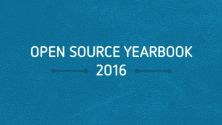Open source software enables Google to build things quickly and efficiently without reinventing the wheel, allowing us to focus on solving new problems. We stand on the shoulders of giants, and we know it. This is why we support open source and make it easy for Googlers to release the projects they're working on internally as open source.
We've released more than 20-million lines of open source code to date, including projects such as Android, Angular, Chromium, Kubernetes, and TensorFlow. Our releases also include many projects you may not be familiar with, such as Cartographer, Omnitone, and Yeoman.
Looking back at the projects we've open sourced in 2016, there's a lot to be excited about. We have released open source software, hardware, and datasets. Let's take a look at some of this year's releases.
Seesaw
Seesaw is a Linux Virtual Server-based load-balancing platform developed in Go by our site reliability engineers. Seesaw, like many projects, was built to scratch our own itch.
From our blog post announcing its release: "We needed the ability to handle traffic for unicast and anycast VIPs, perform load balancing with NAT and DSR (also known as DR), and perform adequate health checks against the backends. Above all we wanted a platform that allowed for ease of management, including automated deployment of configuration changes."
Vendor Security Assessment Questionnaire (VSAQ)
We assess the security of hundreds of vendors every year, and have developed a process to automate much of the initial information-gathering with VSAQ. Many vendors found our questionnaires intuitive and flexible, so we decided to shared them. The VSAQ framework includes four extensible questionnaire templates covering web applications, privacy programs, infrastructure, and physical and data center security. You can learn more about it in our announcement blog post.
OpenThread
OpenThread, released by Nest, is a complete implementation of the Thread protocol for connected devices in the home. This is especially important because of the fragmentation we're seeing in this space. Development of OpenThread is supported by ARM, Microsoft, Qualcomm, Texas Instruments, and other major vendors.
Magenta
Can we use machine learning to create compelling art and music? That's the question that animates Magenta, a TensorFlow-based project from the Google Brain team. The aim is to advance the state of the art in machine intelligence for music and art generation, and to build a collaborative community of artists, coders, and machine-learning researchers. Read the release announcement for more information.
Omnitone
Virtual reality (VR) isn't nearly as immersive without spatial audio, and much of VR development is taking place on proprietary platforms. Omnitone is an open library built by members of the Chrome team that brings spatial audio to the browser. Omnitone builds on standard Web Audio APIs to deliver an immersive experience and can be used alongside projects such as WebVR. Find out more in our blog post announcing the project's release.
Science Journal
Today's smartphones are packed with sensors that can tell us interesting things about the world around us. We launched Science Journal to help educators, students, and citizen scientists tap into those sensors. You can learn more about the project in our announcement blog post.
Cartographer
Cartographer is a library for real-time simultaneous localization and mapping (SLAM) in 2D and 3D with Robot Operating System (ROS) support. Combining data from a variety of sensors, this library computes positioning and maps surroundings. This is a key element of self-driving cars, UAVs, and robotics, as well as efforts to map the insides of famous buildings. More information on Cartographer can be found in our blog post announcing its release.
This collection is just a small sampling of what we've released this year. Follow the Google Open Source Blog to stay apprised of Google's open source software, hardware, and data releases.





Comments are closed.